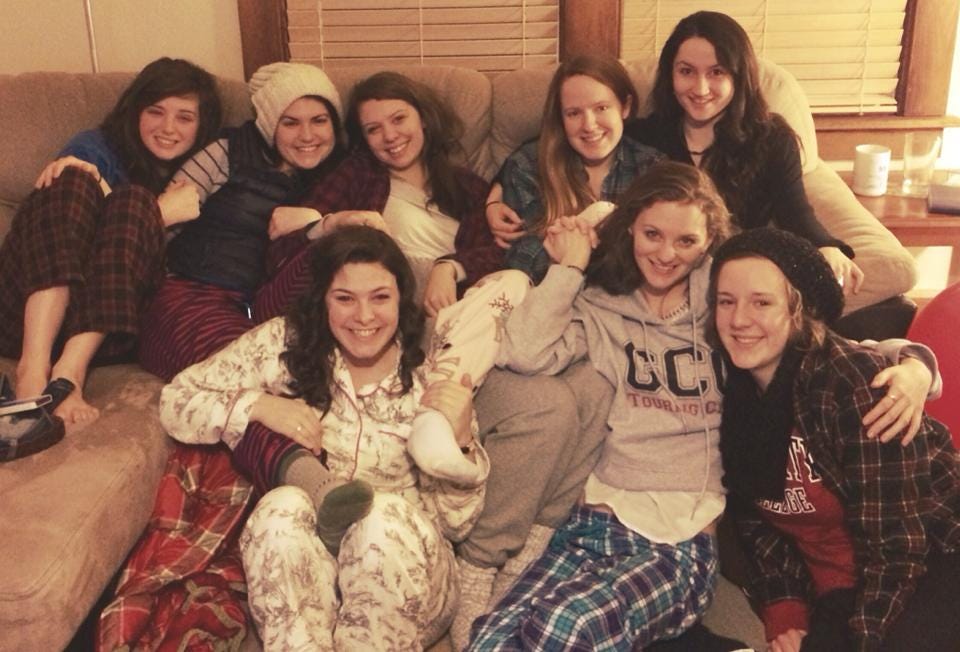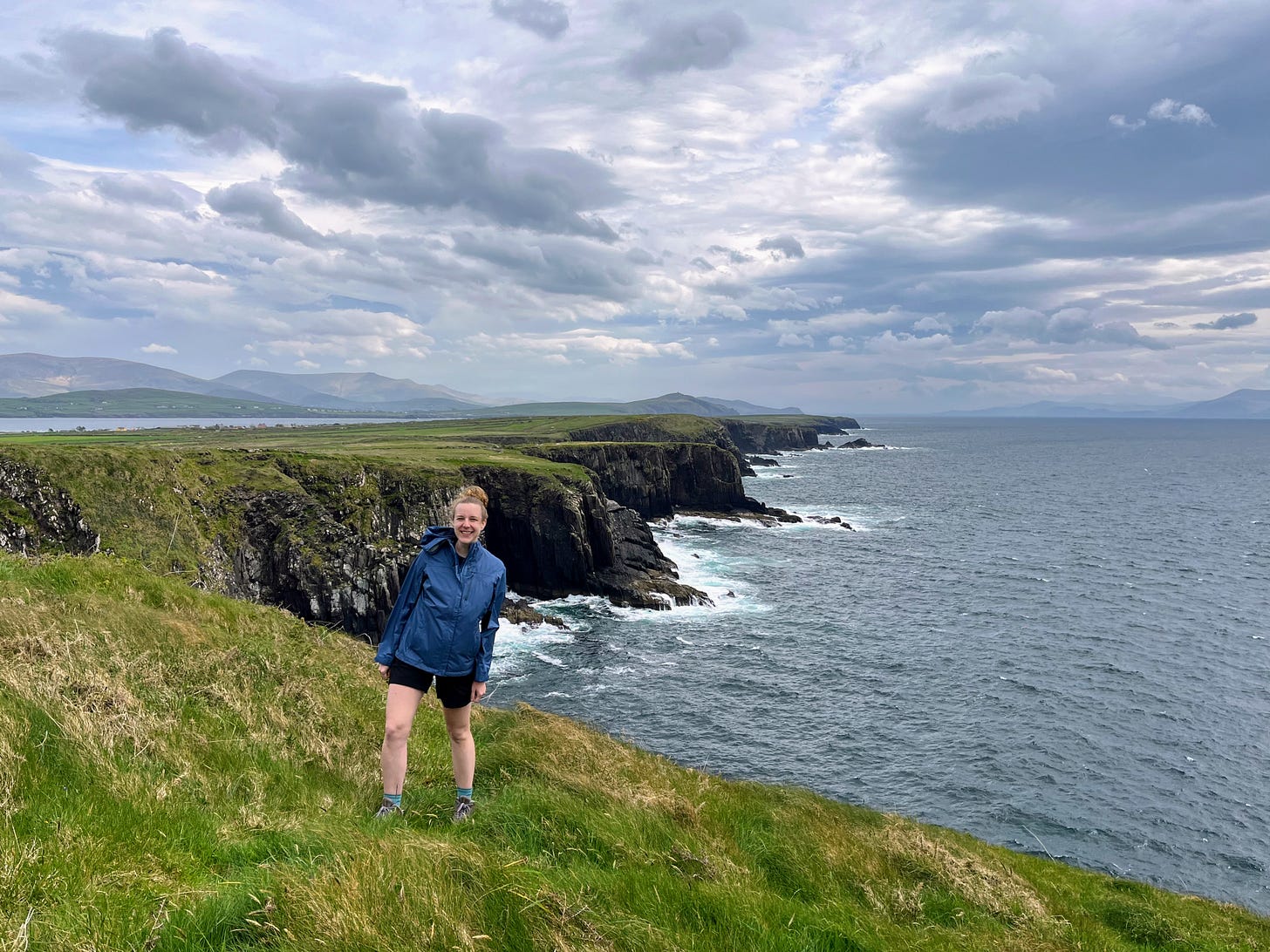Nine years ago, I graduated from college on a rainy May day after listening to a rousing commencement address by an extremely accomplished man whose speech was titled “The Power of Knowledge.” Since then, I’ve lived in three different cities and had five different jobs. I’ve watched friends become spouses then parents, visited them in apartments in foreign countries, and carried their boxes to fourth-floor walk-ups on scorching hot summer days. I’ve celebrated promotions and pregnancies, engagements and adoptions. I got bangs…and I grew them out! I survived two marathons, one sacral stress fracture, a pandemic, and three presidential election cycles.
I’ve also attended the funerals of friends’ parents and buried two of my grandparents. I’ve gotten a text about the bleeding that they couldn’t stop and answered the phone after a friend finished signing her divorce papers. I’ve stood in a hospital room after my nephew passed away on the same day he was born and watched my sister-in-law lose her hair during the course of chemotherapy. I’ve had countless conversations about hard things and sad things and painful realities that aren’t going away anytime soon.
Frankly, it’s been kind of a lot.
College is often viewed as a time of equipping — when the malleable minds of its youthful participants are cultivated with ideas and captivated with inspiration for what the future may hold. The tasks of academia are taken up to prepare students for life after college — whatever that may look like or wherever it may take us, or so we hope. As much as my professors tried to fill my mind with edifying (and powerful) knowledge and good books, my four years of college were never designed to prepare me entirely for what came next. Just as having car insurance doesn’t mean I am ensured that I won’t crash my car, going to college didn’t mean I would emerge from the experience ready for what would happen next. And what came next was much harder than I expected.
One day a few years ago, when I was feeling particularly frustrated by, well, everything, I found myself looking at my bookshelf. Hemingway, Faulkner, Ralph Ellison, Marilynne Robinson, Cormac McCarthy, W. E. B. Dubois, and Flannery O’Connor line the shelves, relics from the American Literature classes I took every semester. With sudden clarity, I realized: my feeling of unpreparedness in my and my loved ones’ suffering was not because my professors had avoided talking about suffering, but because I had treated suffering as an academic abstraction — something that only happened in the books on my shelves, not to people I knew and certainly not to me.
My senior year, the final paper I wrote was an essay titled “A Good Reader is Hard to Find: A Discussion of the Readability of Flannery O’Connor for the Non-Christian Reader.” (What a title…) In it, my thesis served as a warning against the wide readership of O’Connor’s work, arguing that its grotesque nature put too much emphasis on the violence of the Cross rather than the glory of the Resurrection. I asserted that, to a non-Christian, O’Connor’s “glorification of violence” (my words) seemed more likely to turn people away from Christ rather than towards him.
While I was trying to make an edgy argument, the essay was mainly inspired by my distaste for the world O’Connor wrote about. I was frightened by her murderers and disgusted by her Bible salesmen. I much preferred reading about the baptism of kittens in Robinson’s Gilead to the deadly baptism in O’Connor’s The Violent Bear It Away. But as O’Connor wrote in a letter from 1955 — three years into the seven she was told she had remaining to live — “The truth does not change according to our ability to stomach it.”
In the years that followed graduation, I kept expecting that the story of my own post-grad life would read more like the script of a chick flick than any of the books I read in college. I had hoped that my post-grad life was to be lived in a world that didn’t scare me, didn’t hurt me, didn’t cause pain to me or anyone I loved. I would quickly learn, however, that suffering was on the syllabus. When it became clear that the good parts of adulthood were almost always mixed up with grief, I became bitter. “Why did no one warn me? Why did no one tell me the truth?!” Never mind that Psalms class where I learned that nearly half of the book is made up of laments. Never mind the history courses where I learned of centuries of human hardship. Never mind my English lectures, where we discussed stories where characters experienced suffering and scorn at the hands of a God who increasingly felt like a bad author.
At times, I pined for my college years when suffering was an abstraction, something I read about in books. To again quote O’Connor, “To expect too much is to have a sentimental view of life and this is a softness that ends in bitterness.” Years later, I’ve come to learn that if God had given me what I felt I could stomach — a life without suffering — I might have missed out on one of the most profound gifts of life: the sacred opportunity to stand with loved ones in their pain and experience the balm of Christ together. In trying to just get to the good parts, I almost missed the good part.
In May of 2023, my best college friend and I took a hiking trip on the western coast of Ireland to circumvent the Dingle Peninsula. On the third day of our hike, we turned a bend on the path to see cliffs peaking out over a hillside. What was on the other side of that hill, we wondered? To see the potential view, we would need to hop a ditch and then climb over a barbed wire fence. We decided to go for it. Jumping the ditch one at a time and boosting each other up and over the fence, what awaited us on the other side could only be described as the most stunning scenery I’ve ever laid eyes on.
We stood there in awe, eyes welling up with tears as we took in a sweeping view of the mountains and the sky and the sea. We set our packs down and reclined on the most lush and comfortable grass I’ve ever felt and ate ham and cheese sandwiches on slices of brown bread. While the view was beautiful, what was even more beautiful was the fact that I was there with this particular friend to see it. In the years previous, this friend went through a sad and painful divorce that we didn’t see coming. To date, it’s been one of the hardest experiences I’ve walked through with someone, and something that impacted my faith and friendships in a weighty way. For both of us, post-grad life had contained sufferings and setbacks that felt, at times, all-consuming and overwhelming. This trip was not something we should have been on had life turned out how we thought it would.
And yet.
And yet there we were. Even when life doesn’t go how you think it will, years later, you might find yourself on a hike in rural Ireland with a dear friend who you have suffered alongside, and together you get to share in a holy moment of surprise and awe and wonder. It feels like Jesus is there, and it’s because he is and always has been. Standing on that cliff overlooking the sea and the sky was one of the most profound and peaceful moments of my life, and something I will remember forever. That memory is not just about me and my friend, but about how journeying with Jesus leads us to a life that is always better than our preconceived dreams or present imaginations can conjure up. Sometimes you just have to hop some barbed wire fences, get a few scratches, and find out what beauty awaits on the other side.
I am 31 now, so I don’t know how much longer I can claim “young adulthood,” or write about “post-grad life,” but this much is true: I expected both too much and too little from my young adulthood. I expected too much of my college — of what my professors could teach me and protect me from in my post-grad life to come; the power of knowledge only goes so far. I also expected far too little of God — of the tenderness of his character and the validity of his promises and how far the power of his love will go to comfort and keep us in his care. While I naively did not expect the suffering that I’ve experienced and watched loved ones go through, it would have been a mistake to remain bitter towards my alma mater or, more importantly, towards God. I was and am ill-equipped for this life, but maybe that’s the point.
Christians love to remind each other that “God never gives us more than we can handle,” forgetting that Christ pleaded to God in the midst of his pain, “My soul is overwhelmed with sorrow to the point of death!” Jesus follows this by asking his disciples, “Stay here and keep watch with me.” Though the disciples ultimately fail to do this for Jesus, Jesus does not fail to do that for us. The ascension, which we will celebrate at the end of this month, reminds us that though Christ is absent from our physical experience, the Spirit is always with us. As Romans 8:26 says, “For we do not know what to pray for as we ought, but the Spirit himself intercedes for us with groanings too deep for words.”
On days when our souls are overwhelmed with sorrow, a prayer from O’Connor’s journal can guide us as we cry out to God: “Give me the courage to stand the pain to get the grace, Oh Lord. Help me with this life that seems so treacherous, so disappointing.” In our treacherous and disappointing days as well as our glorious and glad ones, the Spirit keeps watch over us in all places, in all times — giving us the courage to stand in the pain and get the grace.
Nine years after graduating, and this is a lesson I am still learning: though suffering is still on the syllabus, grace is, too. We may not always feel equipped with the right words or solutions for the suffering we encounter, but we are given the grace of each other: co-laborers with and towards Christ, guided by the Spirit. I am not alone. And because of this, I can agree with O’Connor when she says, “I can, with one eye squinted, take it all as a blessing.”







This is all so beautiful and true.
What strikes me most about the types of suffering and grief you mentioned over your past nine years, is that they came from deep love and connection. People only experience so much of others’ griefs if they’ve first learned to love them, and been let in to do so. Those people are blessed to have you.
Holy moments, when we journey with others through the valley and they journey with us through the same.